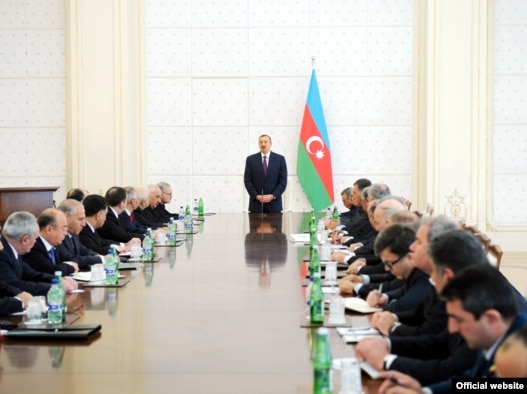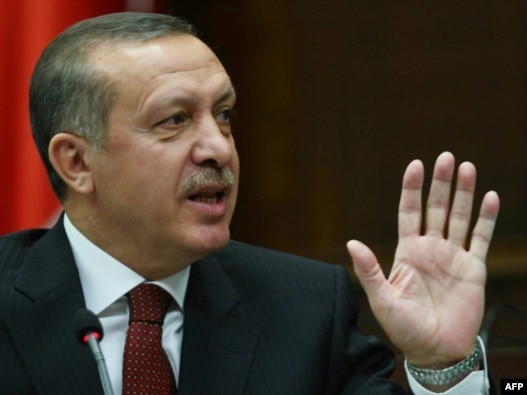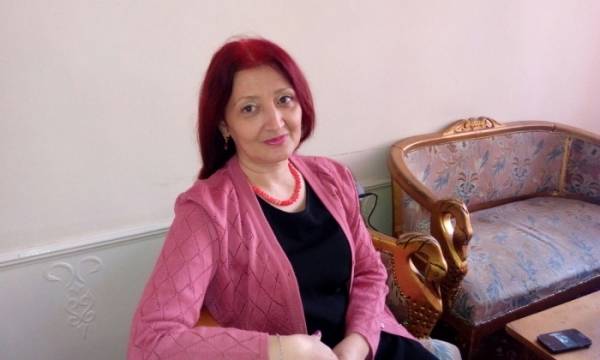
Azerbaijani football fans at the Turkey-Armenia World Cup qualifying match in Bursa in October 2009
April 21, 2010
By Novruz Mammadov
The United States has recently stepped up efforts to repair relations between Turkey and Armenia. Turkey closed its border with Armenia in 1993 in response to the occupation of Nagorno-Karabakh and surrounding Azerbaijani territories by Armenian forces. Lately, U.S. officials have been urging Turkey to ignore Armenia’s continuing occupation and reopen the border. While Washington says that its aim is to improve stability and development throughout the region, in reality U.S. policies have become increasingly pro-Armenian — and exclusive of Azerbaijan.
Washington believes that a Turkish-Armenian rapprochement could kill two birds with one stone. First, it might smooth over — at least temporarily — one of the major trouble spots in U.S.-Turkish relations: the issue of Armenian genocide claims. Second, some U.S. officials argue that improving ties between Armenia and Turkey will ultimately contribute to a resolution of the Nagorno-Karabakh conflict. They appear to believe improved relations will lead to a moderation of Armenian policies and open the way to new initiatives on Karabakh.
However, we must disagree. Armenia continues to occupy almost 20 percent of Azerbaijan’s internationally recognized territory. It is ironic that while claiming to be the first victim of genocide in the 20th century, Armenia itself carried out one of the century’s major ethnic-cleansing campaigns in Europe — a campaign that resulted in thousands of deaths and the displacement of nearly 1 million Azerbaijanis. Many members of the Armenian political elite — including President Serge Sarkisian — rose through the ranks because of their personal involvement in the Nagorno-Karabakh war. They have used the war as a pretext for strengthening their own hold over Armenian politics, so it is not surprising that they have not been constructive in settlement talks.
Pretext For Occupation
Azerbaijan has proposed granting the highest form of autonomy to Nagorno-Karabakh and is prepared to invest heavily in the region’s development once a peace deal is reached. Baku has been cooperating closely with the Minsk Group of the Organization for Security and Cooperation in Europe (OSCE) to resolve the conflict peacefully.
However, Armenia remains intransient, and this creates the suspicion that Yerevan wants to keep the conflict unresolved as an excuse for indefinite occupation.
In this context, Armenia’s closed borders are the main form of leverage that might compel Yerevan to engage seriously in the resolution of the conflict. There is no reason to believe that opening the borders will make Armenia more willing to compromise; on the contrary, removing this sole punishment will only increase Armenia’s interest in further entrenching the status quo.
We understand that Armenia has a powerful diaspora and that justice does not necessarily always prevail. Over the last 15 years, despite maintaining the occupation of part of a neighboring country, Armenia has received preferential treatment from the West, which has actually punished Azerbaijan. The infamous Section 907 of the U.S. Freedom Support Act, which banned direct U.S. aid to Azerbaijan, is a clear example of this. Western governments and media have largely been silent on the plight of the nearly 1 million Azerbaijanis who were displaced by Armenian aggression. This has naturally led the Azerbaijani public to think that the West’s talk of democracy and human rights is nothing more than a selectively applied method of promoting its own interests.
In Defense Of Justice
It is high time for the United States and Europe to adopt a fair position and to prevent the narrow interests of their Armenian lobbies from prevailing over justice and their own national interests.
In any event, attempts to pressure Ankara to abandon Azerbaijan are shortsighted and likely to backfire. Azerbaijan and Turkey are strategic allies with deep historical ties. Turkey has played an important role in Azerbaijan’s partnership with the West on key security and energy projects. Azerbaijan spearheaded the opening of Caspian energy resources to the West and insisted that major oil and gas pipelines be routed through Georgia and Turkey.
Baku has also wholeheartedly supported U.S. security initiatives by sending troops to Kosovo, Iraq, and Afghanistan. Azerbaijan also provides supply-transit support for the NATO effort in Afghanistan. Those who know the region understand the significant risks Azerbaijan took and the pressure it overcame in order to pursue close cooperation with the West on energy and security issues.
Long-term peace and normalization of relations in the South Caucasus cannot be achieved by rewarding aggression and by excluding the region’s strategically most important country. By pushing Turkey to abandon Azerbaijan, the United States risks alienating one of its most important and reliable partners in a critical region of the world.
Novruz Mammadov is head of the Foreign Relations Department of the Presidential Administration of Azerbaijan. The views expressed in this commentary are the author’s own and do not necessarily reflect those of RFE/RL
https://www.rferl.org/a/Excluding_Azerbaijan_Cannot_Bring_Stability_To_The_South_Caucasus/2020228.html




 Azerbaijan — President Ilham Aliyev chairs cabinet meeting on first quarter 2010 socio-economic results, Baku, 14Apr2010
Azerbaijan — President Ilham Aliyev chairs cabinet meeting on first quarter 2010 socio-economic results, Baku, 14Apr2010

 Turkey — Prime Minister Recep Tayyip Erdogan addresses members of parliament from his ruling AK Party in Ankara, 19Apr2010
Turkey — Prime Minister Recep Tayyip Erdogan addresses members of parliament from his ruling AK Party in Ankara, 19Apr2010


 Israeli President Shimon Peres (left) and his Azerbaijani counterpart, Ilham Aliyev, in Baku on June 28, 2009
Israeli President Shimon Peres (left) and his Azerbaijani counterpart, Ilham Aliyev, in Baku on June 28, 2009